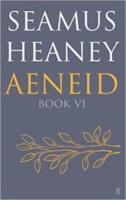
The Aeneid, posthumously published in 19 BC, receives this posthumously published translation of its eschatological heart by one of the most distinguished modern poets. How much it retains of its original and how much is new, one may ask. To call it the Heaneid is a flippant but neat portmanteau description of a poem tasting of two authors. In a preface (‘Translator’s Note’), H. sketches his engagement with the book from school days, to the death of his father and birth of his first granddaughter. It would be fascinating to see a similar preface from Virgil, but how different, how political would that have been? H.’s enthusiasm for it wanes at the book’s climax, Anchises’ revelation of the future great men of Rome. He even refers to a poet moving ‘from inspiration to grim determination’ to complete the task. Still, hoc opus, hic labor.
H. writes blank verse, a flexible metre particularly suited to English, where it was first used in Surrey’s 16th C translations of parts of the Aeneid. Occasionally the distinctive rhythm at the end of a Virgilian hexameter can be felt as in ‘overwhelmed in the turmoil’. Sentences flow easily, many verses are not end-stopped, and enjambment sometimes works to significant advantage, as when Palinurus finally sights land:
‘I rose on a swell and got my first glimpse
Of Italia.’
However, an uncomfortable contemporary resonance is similarly highlighted:
‘Down to these sunless, poor abodes, this land
Of troubles.’
H.’s diction does not strain to become grandiose, somehow transcends the colloquial, never has a ‘crabbed turn’ or ‘congested cadence’, but exhibits an occasional ‘see here’. While Phlegethon, a river in Hades, is described with suitably awesome compound adjectives (‘rock-rumbling, thunder-flowing’), Deiphobus’ scars are ‘love bites’, a phrase in a way appropriate, but surely bathetic. Where Virgil astounds, for example in describing Charon (stant lumina flamma), H. does not seek to clarify (as a scholar may: ‘his eyes are unmoving and fiery’ [Horsfall]) but adopts the bold metaphor (‘The eyes stand in his head and glow’). When describing the wraith of Aeneas’ father slipping through his grasp (volucrique simillima somno). H. startles (though risking bathos?) with ‘a dream on wings’. The impossible pius Aeneas (9) becomes ‘Aeneas devoted as ever’, a better choice in the context than ‘in duty bound’, ‘god-fearing’, even ‘devout’ and ‘righteous’ which appear in other recent literary translations. Dryden’s ‘The Pious Prince’ is too grand now. H. can reproduce Virgil’s alliteration effectively, as at 833 where it raises the emotional temperature in Anchises’ warning against the horror of civil war: neu patriae validas in viscera vertite viris becomes ‘do not / bloody the bosom of your country with vicious, / valiant battle’. The echo of validas in ‘valiant’ and viscera in ‘vicious’ may mostly be missed, but the juxtaposition of ‘vicious’ and ‘valiant’ neatly captures conflicting emotions of civil war.
‘Neither a “version” nor a crib: it is more like classics homework’ H. tells us – risking 6 out of 10 – in his opening note. It is an affectionate tribute to his Latin teacher who ‘created an inner literalist’, but it is much more the product of a poet attentive to demands of writing verse. The result is a fluent narrative (only ‘scringe’ caused a rush to the dictionary) and an imaginative response to Virgil’s Latin.
Alan Beale
